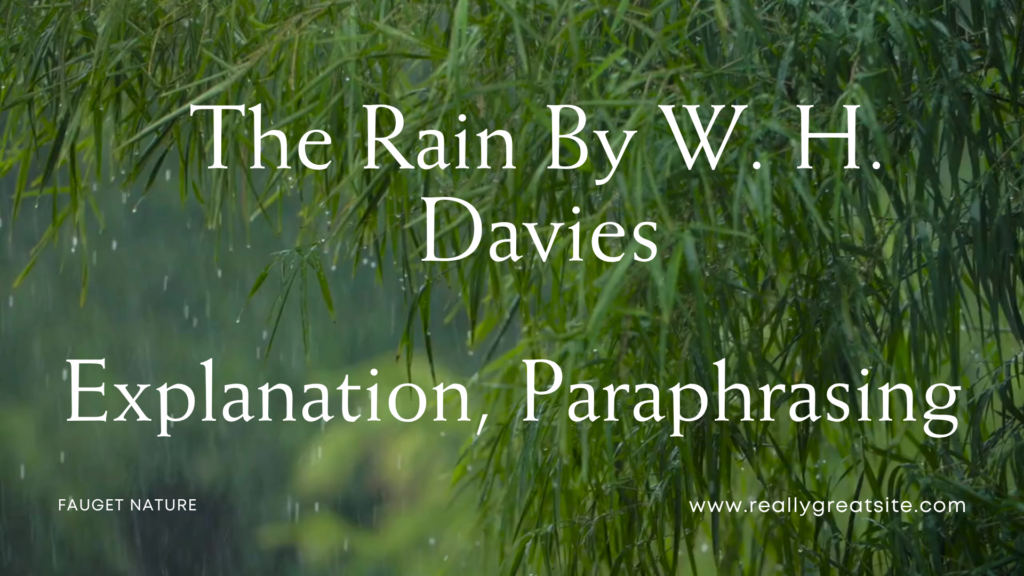The Rain poem easy explanation below:

Close your eyes for a moment… Imagine you’re sitting near a window, and you hear the soft sound of rain tapping gently on green leaves. What do you feel? Calm? Curious? Or maybe just thoughtful for a moment?
“The Rain” by W. H. Davies is a concise yet powerful poem that transforms a simple moment into a profound lesson about life, nature, and the value of gratitude. Let’s dive in together — line by line — and discover what makes this poem so meaningful for students and poetry lovers alike.
Who Was W. H. Davies?
W. H. Davies was a well-known Welsh poet famous for his simple yet deep poems about everyday life and nature. Despite living as a wanderer for many years, he found beauty in ordinary things, like a rainy day or the leaves on a tree. The Rain is one of his most loved poems — clear, musical, and full of hidden truth. [Now Enjoy The Rain poem easy explanation]
Reading the Poem
Before we break it down, here’s the poem itself:
I hear leaves drinking rain;
W. H. Davies
I hear rich leaves on top
Giving the poor beneath
Drop after drop;
‘Tis a sweet noise to hear
These green leaves drinking near.
And when the Sun comes out,
After this Rain shall stop,
A wondrous Light will fill
Each dark, round drop;
I hope the Sun shines bright;
‘ Twill be a lovely sight.
What Is The Rain About?
At first glance, The Rain is simply about rain falling on leaves. The rich leaves at the top catch the fresh drops first. The poor leaves below get whatever trickles down. But W. H. Davies shows us much more through this gentle picture.
The poem reminds us that life is not always fair — some people get life’s blessings first, while others must wait for whatever comes after. But the poet also tells us that even the smallest drops hold beauty, peace, and hope if we learn to notice them.
It’s nature’s soft way of teaching us about sharing, patience, and gratitude. [The Rain poem easy explanation]
First Stanza — Paraphrased Explanation
In the opening stanza, Davies crafts a serene and vivid scene that invites us to listen closely. He imagines the leaves quenching their thirst, savoring the rain like a gentle, refreshing sip. The “rich leaves” perched above get first dibs on the fresh droplets, while the “poor leaves” below patiently await the trickle down.
This simple yet poignant imagery speaks volumes about society. Just as the upper leaves revel in abundance, those with wealth and power tend to relish life’s luxuries first. Meanwhile, the less fortunate, akin to the lower leaves, must settle for whatever drizzles down.
However, Davies doesn’t voice bitterness; instead, he highlights how this fleeting moment in nature mirrors the broader truths of existence. The lower leaves may endure, but they still partake—they drink, they shimmer. The soft sound of rain nourishing them creates a melody that soothes the poet’s heart. It’s a beautiful reminder that even the smallest blessings hold significance when we learn to cherish them.
Second Stanza — Paraphrased Explanation
In the second stanza, the poet invites us to witness the enchanting transformation that follows the rain. As the last droplets fall, the sun bursts forth with its radiant light, illuminating each raindrop like a myriad of tiny jewels. The leaves, once cloaked in gloom, now shimmer with life, refreshed and brightened by the sun’s warm embrace.
Davies yearns for the sun to blaze brightly, turning the dreariness of the rainy moment into a breathtaking spectacle. The rain enriches the leaves with nourishment, while the sun rejuvenates them, casting a golden glow. Under the shelter of this tree, the poet revels in the delightful symphony of the dripping drops.
This gentle, soothing melody washes away his worries and gently ushers in a sense of calm. In this serene slice of nature, he discovers a profound truth: peace often emerges in the aftermath of adversity, just as the storm clears to unveil fresh, invigorating air.
The Hidden Lesson – The Rain explanation
In his poignant lines, W. H. Davies reveals a timeless truth: while life may often feel unjust, beauty and hope are always present if we’re willing to open our eyes to them. This poem elegantly nudges us to remember that even those who have little can discover joy in nature’s gentle murmurs.
As the old saying goes: “Every cloud has a silver lining.” Even when life feels burdensome, we must hold onto the belief that peace will eventually return, much like the sun emerging after a rainstorm. So, let’s embrace the moments of tranquility and inspiration that surround us, no matter how small they may seem.
A Gentle Goodbye
So, the next time you hear rain tapping on your window, pause for a moment. Close your eyes and really listen — just like W. H. Davies did. Maybe you’ll hear more than just raindrops. Maybe you’ll hear a quiet reminder to appreciate the smallest blessings in your life.
What does rain make you feel — sadness, peace, or something else? Tell me in the comments below — I’d love to know your thoughts!
And if you enjoyed this explanation, don’t forget to share it with your classmates and friends. Bookmark theenglishdiary for more simple, clear lessons that make English literature easy to understand and love.
Until next time — keep learning, keep listening, and always look for the gentle lessons nature has to offer.